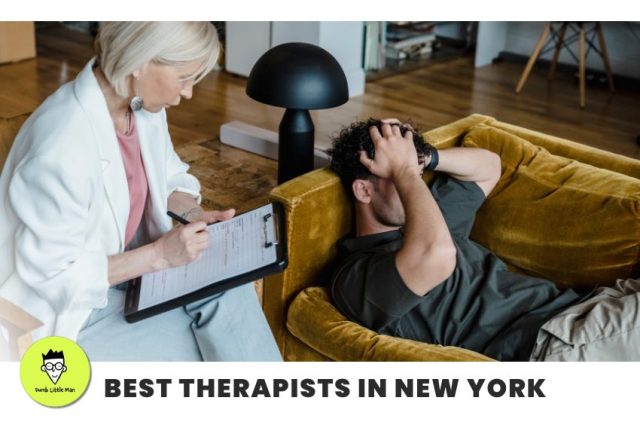5 Best Therapists in New York 2024
By Dumb Little Man
April 29, 2024

Making the decision to try treatment may be quite difficult. Likewise, finding the ideal therapist in New York City brings on an additional degree of stress.
You want someone who is very understanding, very relatable, quite knowledgeable, won’t break the bank, and won’t have you wait a long time for an appointment. That seems like a rather high order. But rest assured—we’ve got you covered. We’re here to provide all the information you need to choose the best therapist in the Big Apple and have a successful therapeutic experience.
Why and when should you get a therapist?

For many reasons, seeing a therapist may completely improve your life. First of all, counseling may assist you in sorting through all of those ideas and feelings if you’re feeling trapped, overwhelmed, having emotional pain, or low self-esteem. It’s similar to having a reliable guide to lead you through the ups and downs of life.
If you’re struggling with mental health issues like anxiety, depression, or other issues, therapy can be quite beneficial. You don’t have to do it alone when you have a therapist by your side; they can provide you support, coping mechanisms, and a private setting in which to discuss your issues and mental health condition.
Counseling isn’t just for when everything is falling apart. It may also be a highly useful tool for self-improvement and self-discovery. A therapist may assist you in achieving your goals, whether they include increasing your self-esteem, strengthening your relationships, or discovering your true calling in life.
As for when to get a therapist, well, there’s no one-size-fits-all answer. It really is up to you and your particular circumstances. However, it could be worthwhile to attempt counseling if you’re finding it difficult to deal, feeling overwhelmed, or just don’t know where to turn. And never forget that it’s okay to seek for assistance; in fact, consulting a therapist is a courageous and crucial first step toward taking care of yourself.
What is the difference between a counselor and a therapist?

The terms “counselor” and “therapist” are often used interchangeably, but there are some distinctions between the two roles.
Generally, a counselor is someone who provides guidance and support to individuals or groups facing various challenges in their lives. They often focus on specific issues such as career counseling, substance abuse, marriage and family counseling, or school counseling.
A mental health counselor, and other kind of counselors typically hold a bachelor’s or master’s degree in counseling or a related field, and they may work in settings such as schools, community centers, or private practices.
On the other hand, a therapist is a broader term that encompasses a range of mental health professionals who provide treatment for emotional, psychological, or behavioral issues. Therapists may include psychologists, social workers, marriage and family therapists, or licensed professional counselors.
They are trained to assess, diagnose, and treat mental health conditions using various therapeutic techniques. Therapists often have advanced degrees (such as a master’s or doctoral degree) and are licensed by their state to practice psychotherapy.
While both counselors and therapists offer support and guidance, counselors tend to focus on specific issues and may have a narrower scope of practice, while therapists are trained to address a wider range of mental health concerns and typically have more extensive education and training.
Here are the top five therapists Singapore:
- Freedom Institute
- Center for Motivation and Change
- Ackerman Institute
- Present Centered Therapies
- Therapy Global
5 Best Therapists in New York 2024
#1 Freedom Institute
Basic Information
- Website: https://www.freedominstitute.org/
- Email: [email protected]
- Phone: (212) 838-0044
- Address: 515 Madison Avenue New York, NY 10022
Overview
Located in New York City, Freedom Institute was established in 1976 by Mona Mansell, who was recovering from alcoholism. This non-profit outpatient facility emphasizes the value of including family members in addiction therapy. The center offers cutting-edge, evidence-based therapies tailored to fit the unique requirements of its clients, including clinical examinations and a range of outpatient services. It was among the first in the country to use this strategy.
The Freedom Institute stands out for its persistent progress in incorporating family structures into the treatment of substance dependence. It is the only facility in the country that integrates family treatment methods like Relational Family treatment and Dialectical Behavior Therapy (DBT) with Intensive Outpatient Programming. This method offers a comprehensive treatment environment that tackles addiction problems in the context of family dynamics with the goal of healing not only the person but the entire family.
#2 Center for Motivation and Change
Basic Information
- Website: https://motivationandchange.com/
- Phone: (866) 887-1197
- Address: 519 8th Ave 9th Floor New York, NY 10018
Overview
CMC creates individualized therapy programs for each of its clients by fusing a compassionate approach with evidence-based treatment. This approach, which they sum up as “science plus kindness equals change,” combines a courteous, client-centered methodology with scientifically validated tools and tactics. CMC ensures that every plan it creates respects the customer’s integrity and individual preferences while tailoring its services to suit a range of client goals and levels of change preparedness.
The focus of CMC’s approach is on doable, realistic methods for bringing about change. Identifying the customers’ own motivations for change and creating an actionable strategy that they can actively support are the first steps in the process. CMC therapists use motivational and cognitive-behavioral techniques to help clients see the relationships between their feelings, ideas, and actions.
In addition to ending harmful habits, the objective is to improve clients’ general life satisfaction, giving them the freedom to take charge of their lives and work toward their most important objectives.
#3 Ackerman Institute
Basic Information
- Website: https://www.ackerman.org/
- Phone: (212) 879-4900, ext. 100
- Address: Ackerman Institute for the Family 936 Broadway, 2nd Floor New York, NY 10010
Overview
Founded in 1960 by Dr. Nathan W. Ackerman, the Ackerman Institute for the Family has established itself as a leading institution for family therapy and training in the United States. After World War II, Dr. Ackerman was one of the first to integrate family groups into therapeutic settings.
His creative approaches changed the way that therapy was conducted and brought audiovisual recording to family therapy training. In addition to providing comprehensive services at all phases of family life, the Institute is well-known both domestically and globally for its excellent training programs for mental health professionals.
The primary goals of the Ackerman Institute’s purpose are to provide cutting-edge training programs, novel couple and family therapy services, and research to create new therapeutic models and procedures. It strives to incorporate diversity, equity, and inclusion into every facet of its operations and operates with a strong commitment to these principles.
The Institute works to maintain and strengthen a diverse community of clinicians and clients by placing a high priority on social justice and culturally sensitive treatments. This creates an atmosphere where all viewpoints and beliefs are valued and investigated.
#4 Present Centered Therapies
Basic Information
- Website: https://presentcenteredtherapies.com/
- Email: [email protected]
- Phone: (212) 799-0001
- Address: 100 W. 67 Street, Suite #2NE
Overview
With more than 20 years of expertise, Dr. Michael Mongno, who practices integrative psychotherapy and relationship counseling, is based in Manhattan’s Upper West Side. Since establishing Present Centered Therapies twenty-four years ago, Dr. Mongno has built a solid practice renowned for its distinctive fusion of psychological and holistic modalities.
His integrated conversation method creates a warm and meaningful therapy atmosphere by rapidly gaining clients’ trust and confidence. This strategy, together with his own spiritual and personal growth, establishes his practice as a top option for anyone looking for holistic relationship therapy and self-improvement in New York City.
The comprehensive approach of Dr. Mongno combines aspects of Eastern spirituality, Western psychology, Gestalt and experiential therapy, and modern techniques like stress management and mindfulness. His therapy methods have been enhanced by his studies with famous couples therapists such as Esther Perel, Susan Johnson, David Schnarch, and Harville Hendrix. As a result, his services are in great demand for relationship and personal development counseling.
Because of the flexibility of his approaches, he is able to customize treatment to meet the requirements of each patient, using existential, behavioral, cognitive, or spiritual therapies to promote healing and personal growth. His business is conveniently close to Lincoln Center and provides accessible and reasonably priced therapy choices, making his expertise available to a wide spectrum of customers.
#5 Therapy Global
Basic Information
- Website: https://www.therapy-global.com/
- Email: [email protected]
Overview
A group of exceptionally qualified counselors and psychotherapists called Therapy Global uses telemedicine to provide easily accessible mental health treatments all around the world. Several five-star reviews attest to the team’s track record of providing high-quality treatment, with members averaging between 10 and 25 years in practice and holding several master’s degrees.
Therapy Global was established in response to the increased need for mental health help from people who are unable to access standard care settings in their own countries. The need for this support was highlighted during the COVID-19 epidemic. In addition to being in keeping with contemporary convenience, this move to online services guarantees that anybody with an internet connection may get discreet, qualified assistance from anywhere at any time.
Therapy Global is unique in that it is dedicated to providing individualized treatment and superior therapeutic outcomes. The team provides a wide range of treatments, including individual and couples therapy, life coaching, hypnosis, and EMDR in addition to psychotherapy, to ensure complete assistance catered to the individual requirements of each client.
Therapy Global is also committed to social responsibility; each therapist makes a monthly commitment to reduce their carbon footprint and offer free or heavily reduced treatments. In line with their conviction in a comprehensive approach to wellness that promotes environmental health, the organization also donates a percentage of its profits to forestry initiatives and wider mental health access.
This dedication not only improves Therapy Global’s service offerings but also establishes the company as a progressive leader in the mental health industry, benefiting both the environment and its customers’ well-being.
How to find a good therapist in New York?

Finding a good therapist in New York City can seem daunting given the vast number of options, but leveraging several reliable sources can help you find a professional who suits your needs. Here are some practical ways to start your search:
- Ask friends and family: People close to you might have experiences with therapists and can provide personal insights. They may also ask their own therapists for referrals to other professionals within their network.
- Utilize your workplace’s Employee Assistance Program (EAP): Many employers in NYC offer EAPs, which include access to a network of therapists and sometimes free, short-term counseling.
- Check with your insurance company: Your insurer’s website typically lists in-network mental health providers, ensuring credentials are vetted and sessions are affordable.
- Explore online platforms: Websites like Psychology Today provide comprehensive directories where you can filter therapists by location, specialty, and view their personal introductions or videos.
- Use academic institutions for referrals: Universities and some schools have counseling centers that can recommend therapists. If you are connected to a university—as a student, parent, alum, or staff—you can access these services.
- Consult other healthcare providers: Ask healthcare professionals you trust, such as your primary care physician or a naturopathic doctor, as these individuals often have networks that include therapists.
What To Do After You Have Chosen Your NYC Therapist

Once you’ve chosen a therapist in New York City, taking the right steps can help you make the most of your therapy sessions and set the foundation for a productive therapeutic relationship. Here’s what you can do after selecting your NYC therapist:
- Schedule Your Initial Consultation: Contact the therapist to set up your first appointment. This session is typically used to establish communication, discuss your needs and goals, and see if the therapist’s style and approach are a good match for you.
- Prepare for Your First Session: Consider what you want to achieve in therapy and think about the main issues you wish to address. It can be helpful to write down a list of topics or questions you have so you can cover all important points during your session.
- Discuss Logistics: Inquire about session lengths, frequency, cancellation policies, payment methods, and any sliding scale fees if applicable. Clearing up these details beforehand can prevent misunderstandings and help you manage your expectations.
- Establish Communication Preferences: Find out how the therapist prefers to be contacted between sessions if you have questions or if an emergency arises. Knowing whether to email, call, or text can make communication smoother.
- Review Confidentiality Agreements: Understand the confidentiality rules and any exceptions to these rules (such as situations involving harm to oneself or others). This understanding is crucial for building trust.
- Set Personal Goals: Beyond the immediate issues, think about what you ultimately want to gain from therapy. Setting clear, actionable goals can provide direction and help measure progress throughout your therapeutic journey.
- Engage Openly and Honestly: Be as open and honest as possible with your therapist about your thoughts, feelings, and experiences. The more information your therapist has, the better they can help you.
- Commit to the Process: Therapy can be challenging and requires both time and emotional investment. Being patient and committed to the process can lead to more effective and meaningful outcomes.
Conclusion
One of the most important initial steps to maintaining and enhancing your mental health in New York City is finding the correct therapist. It’s crucial to plan carefully for the first few contacts with your therapist after choosing one, since this will provide the groundwork for future sessions. Setting up the initial appointment, preparing conversation topics or questions regarding your mental health issues, and being aware of the practical details like session times, payment options, and cancellation rules are all part of this preparation. With well-defined expectations and a clear way forward, this kind of preparation guarantees that you get off to a good start.
The actual job starts once the logistical elements are worked out. It is essential to communicate honestly and freely with your therapist as this establishes the foundation for successful therapy. Setting objectives for yourself can also assist direct your therapy path and offer standards by which to gauge your advancement. You may get the most out of therapy if you make a commitment to it and actively engage in the recommended exercises and conversations. This dedication not only improves the therapy process but also helps you and your therapist build a solid, fruitful connection that opens the door to major personal development and higher quality of life.
Best Therapists in New York 2024 FAQS
What type of therapist is most effective?
A therapist’s efficacy is mostly determined by your unique requirements and the problems you want to solve, whether they’re eating disorders PTSD and more. Therapists often have a variety of specializations, including family therapy, psychodynamic therapy, dialectical behavior therapy (DBT), eye movement desensitization and reprocessing (EMDR), psychoanalysis, and Cognitive Behavior Therapy (CBT). The key to successful treatment is selecting a therapist whose style and demeanor suit your tastes, taking psychological assessments, and choosing a treatment that suits you as treatment outcomes may vary from person to person.
How do I know a good therapist?
The right therapist will usually be able to help you feel supported and understood. In addition to having the necessary training and credentials, they ought to provide a treatment plan and strategy that work for you. To evaluate the efficacy of their practice, you may also ask for references and read customer feedback. A competent therapist should demonstrate empathy, clearly explain how they can help, and create a plan that aligns with your therapeutic goals during your initial meeting. Also make sure that they are a licensed clinical psychologist, licensed clinical social workers, or equivalent.
How much does a therapist cost in New York?
The cost of therapy in New York can differ significantly depending on a number of criteria, such as the training and experience of the therapist as well as the number and duration of sessions. In general, session costs might vary from $100 to $300. A sliding scale charge depending on income is something that some therapists provide, which can help make sessions more accessible. Furthermore, you should confirm with your health insurance provider if mental health treatments are covered and if there may be a copayment for therapy sessions. Additionally, a lot of therapists charge less for first sessions, which might be an affordable approach to see whether their services are suited for you.
Dumb Little Man
At Dumb Little Man, we strive to provide quality content with accuracy for our readers. We bring you the most up-to-date news and our articles are fact-checked before publishing.


